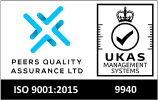What should you look for in a new employee? Someone whose skills and experience hit the mark or the person whose experience may not be quite right, but would be a great fit for your organisation?
It’s not a new debate, but it is one that is particularly relevant in a market where the skills shortage is making the battle for the best talent tougher than ever.
We’ve always been of the opinion that skills can be taught but personality, and everything that comes with it from values to what motivates a person, is what’s at the heart of finding the best person for a role.
Of course, we’re not suggesting that any business hires someone without any of the basic skills and experience they need to do the job. But we do encourage our clients to be open minded about what the ‘right’ person for the job might look like.
We believe that skills and experience make up a relatively small part of what’s important when finding the right person for the job.
That’s why when we interview our candidates we’re more interested in finding out about their values, their abilities and what motivates them, than ticking off the list of requirements on the job description.
This approach isn’t just based on gut instinct, although that’s important too, it’s built around some respected theories, including Maslow’s hierarchy of needs and the Herzberg model of motivation. Both focus on what people need to feel fulfilled. In the context of a job, it means that there is more to employee motivation than the right salary and benefits. In fact, research shows that 83% of candidates look beyond pay and benefits when searching for jobs.
Of course, it’s not just about what our candidates want, this approach means that we also need to spend some time getting to know the businesses we recruit for. Just receiving a job spec isn’t enough for us to find the right person for a role, we also need to find out about the values of an organisation, what its objectives are, and what it needs from employees to reach those objectives.
Company culture is important too. Even the most experienced person isn’t going to be at their most productive in an environment where they feel uncomfortable or working in an organisation that doesn’t meet their needs. Businesses thrive on strong teams that share values and beliefs. In turn, this strengthens motivation and improves performance.
Opting for the best personality fit over a skills match means that clients will have to commit some additional support or training in order to get new employees up to speed. This offers its own benefits as it means they can be trained in a way that best meets the business objectives.
A person who has the ability to do the job and the values that complement those of the business they work for, will always be a better choice than someone with the skills, but whose approach is at odds with the values of an organisation. In the search for the perfect candidate, who will remain an asset to a business for the long term, we will always choose personality over experience.












